The Big Read in short: Is the influx of big-spending S'poreans a factor in Johor Bahru's rising living costs?
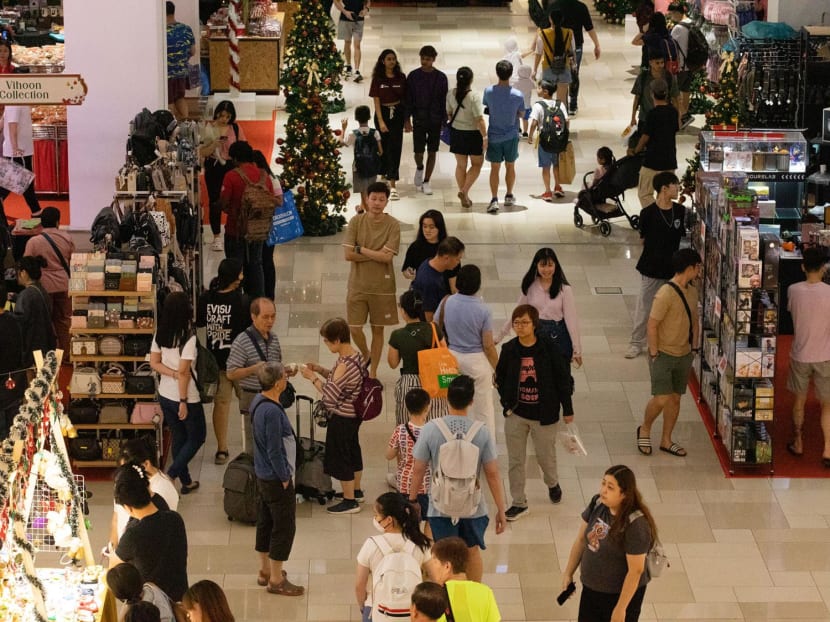
Follow us on TikTok and Instagram, and join our Telegram channel for the latest updates.
Each week, TODAY’s long-running Big Read series delves into the trends and issues that matter. This week, we look at whether Singaporeans love for shopping and holidays in Johor, especially Johor Bahru, have led to rising prices there, a perception that locals have. This is a shortened version of the full feature, which can be found here.
- Since borders reopened and as the Malaysian ringgit continued to slide against the Singapore dollar, Singaporeans have been flocking to Johor for shopping and holidays
- This has led to a perception among Johoreans, particularly those in Johor Bahru, that Singaporeans are driving up their costs of living
- Some Johoreans interviewed by TODAY spoke about how they have been affected by inflation and the behaviour of Singapore visitors
- However, business owners and economists point to various global and domestic factors that have also caused prices to go up in Johor
- These include economic policies Malaysia adopted during the pandemic and geopolitical tensions
AMANDA YEAP
Published December 2, 2023Updated December 2, 2023
WhatsAppTelegramFacebookTwitterEmailLinkedIn
JOHOR BAHRU — Malaysian hawker, Mr Sim, was a step away from buying fresh prawns during a holiday in the Pontian district of Johor, only to be stopped by the exorbitant price quoted by the seller.
The 63-year-old, who declined to give his full name, claimed that the prices were immediately jacked up after the Singaporean tourists who came before him blurted out: “Wah, so cheap!”
ADVERTISEMENT
He said he was quoted RM30, but the group of tourists before him was quoted RM20.
Because of this experience, he wished Singaporeans could keep their thoughts to themselves when shopping in Malaysia, even more so today when the ringgit has seen a continuous slump.
Mr Sim’s experience will resonate with many Johor residents even today, particularly those residing in the state capital, as Johor Bahru has been a favourite destination of Singaporeans for the longest time.
READ ALSO
Explainer: Why the Malaysian ringgit has stayed weak and the wider effect on Singapore
Johor Bahru residents TODAY spoke to appeared disapproving of Singaporeans treating the city as a bargain haven, as there is a perception that the cost of living has soared in the past year due to more tourist arrivals from Singapore and their ability to spend.
However, Johor business owners and economists cited other global and domestic factors, such as the country's economic woes and policies Malaysia adopted during the pandemic as well as current geopolitical tensions, for the inflation faced by Johoreans.
WHY IT MATTERS
Singaporeans have been flocking to Johor for shopping and holiday following the easing of Covid-19 restrictions and the reopening of borders, with lengthy traffic jams at the checkpoints a common occurrence during the weekends and public holidays.For example, during the long weekend from Aug 31 to Sept 4, a record number of more than 1.7 million travellers passed through Woodlands and Tuas checkpoints.
One factor is the steady strengthening of the Singapore dollar against the ringgit, from about 3 at the start of 2020 to new highs of 3.17 in April 2022 and 3.5 today.
This makes dining out in Johor, shopping for groceries, or topping up petrol particularly attractive given its proximity to Singapore, particularly as Singaporeans have also been grappling with high inflation for months.
READ ALSO
Singapore dollar hits all-time high against Malaysian ringgit
Amid this, a Singaporean financial content creator recently reminded his fellow citizens to be humble and sensitive to Malaysians by telling them to stop calling Malaysia "cheap" when they are there.
Many Johor residents told TODAY that they have seen a sharp hike in prices of essential goods since the Movement Control Order (MCO), which started in early 2022 — imposed in early 2020 as Covid-19 cases soared everywhere — was lifted at the end of 2021.
While there are many factors that affect Johor Bahru's rising cost of living, the perception that Singaporeans' arrivals are driving up prices in the city seems to have taken root among the locals.
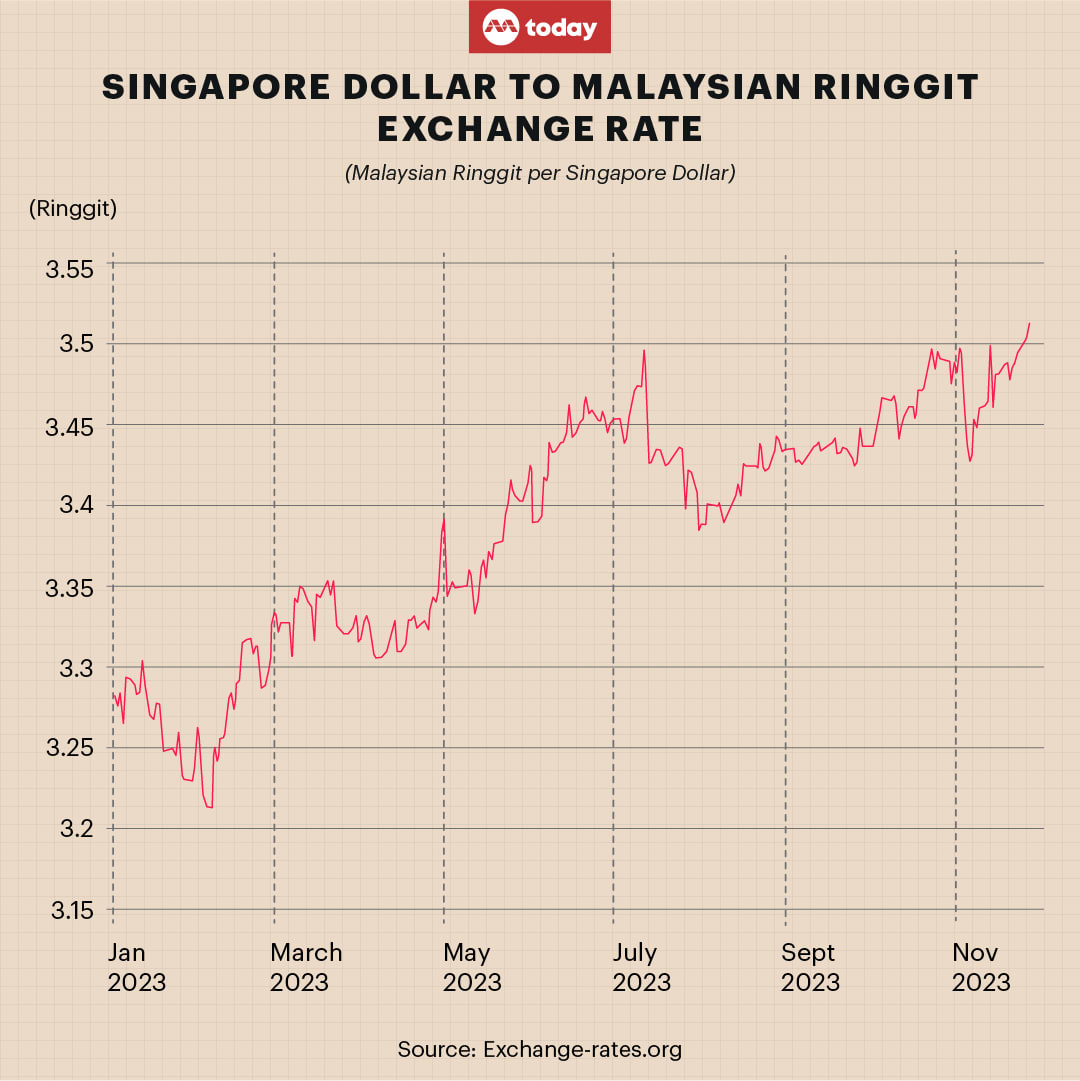
THE BIG PICTURE
Sales executive Siti Atiqah Ahmad Daud, 35, attributed the higher prices of staple foods and increased living costs to the presence of tourists, particularly from Singapore.“A lot of Singaporeans come here because of their stronger currency. They want to eat good food and buy things for cheap here.
“But for locals like us, it's not very good. It's like there's ‘competition’ because they can afford to buy many things at higher prices, and we can't,” she told TODAY.
READ ALSO
#trending: 'Don’t call Malaysia cheap’ — content creator urges Singaporeans to be more humble when shopping there
The mother of three children aged two to 15 said the prices of staple food, such as rice and meat, have risen sharply since the MCO was officially lifted at the end of 2021.
“Now, a lot of things cost at least 50 per cent more than they used to. It’s very sad to see the strength of our ringgit going down,” she lamented.
Retail shop manager Beanz Ho, 31, shares the same sentiment, noting the challenges Johor Bahru residents face with rising costs due to the spending of Singaporeans.
For this reason, Mr Ho prefers to stay in Kulai, a town some 30km from Johor Bahru.
However, not all Johoreans feel that Singaporeans are the cause of higher prices in their state.
Retiree Chin AB, 76, said Malaysians should not “blame” Singaporeans for soaring prices because inflation is happening worldwide, not just in the country.
READ ALSO
Johor Baru businesses await revival after Causeway reopens, Singapore visitors not returning fast yet
“Perhaps, yes, there will be some impact, but ultimately, Singaporeans coming over makes JB a livelier place,” he said.
According to a report by the Department of Statistics in Malaysia, Johor’s year-on-year inflation as of October — the latest figures available — is at 1.7 per cent.
The top five categories that reported the highest year-on-year inflation in Johor are:
- education (7.5 per cent)
- restaurants and hotels (4.1 per cent)
- health (3.8 per cent)
- food and beverages (3 per cent)
- furnishing and household maintenance (2.4 per cent)
These include a RM300 monthly allowance given to Johor fishermen and a rice aid programme where all households are entitled to a 10kg bag of rice. Married couples get relief with a one-off RM1,000 financial assistance under a programme for newlyweds.
The state has also set aside more than RM300 million in the Johor 2024 Budget to assist residents who fall within the lowest 40 per cent category by income.
Previous
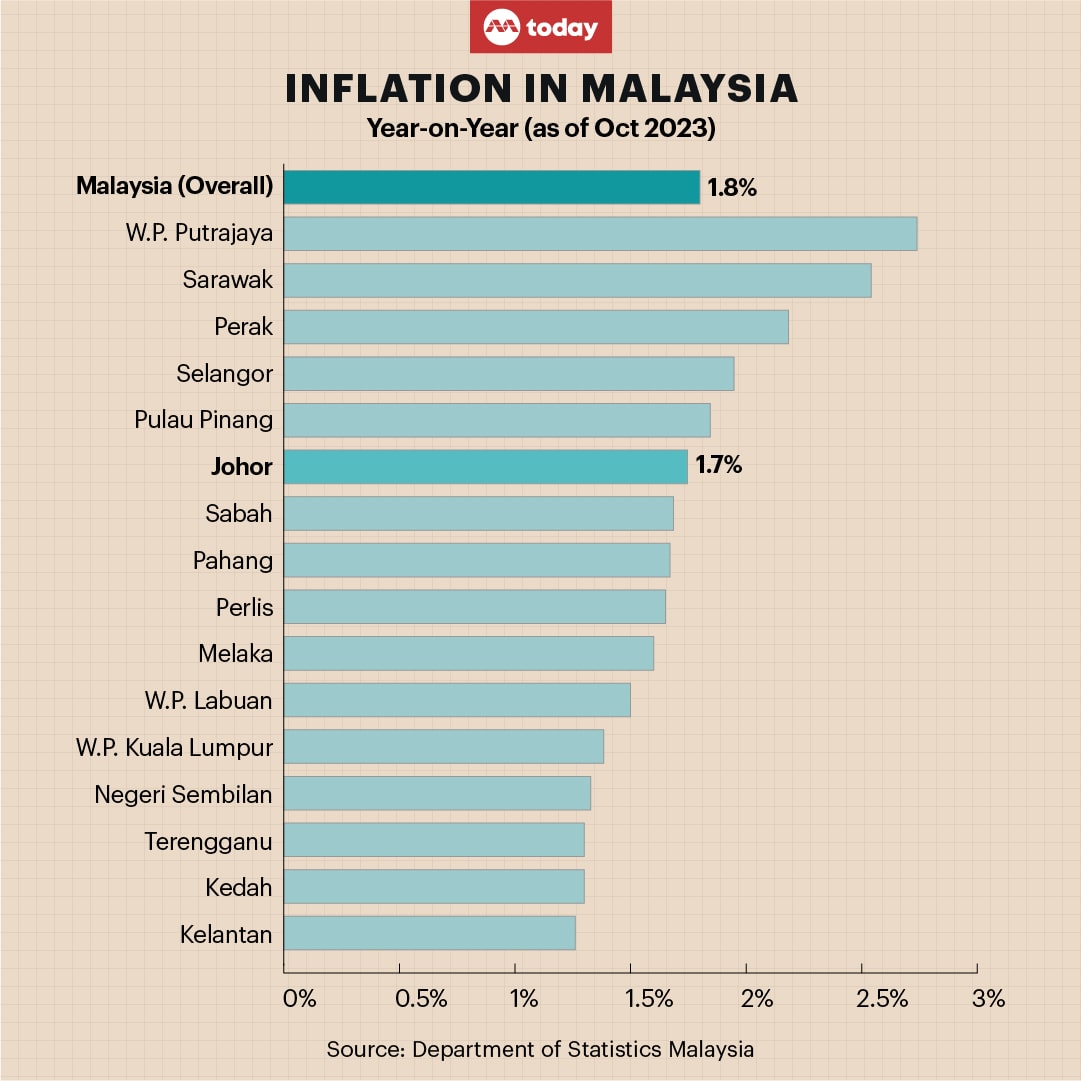
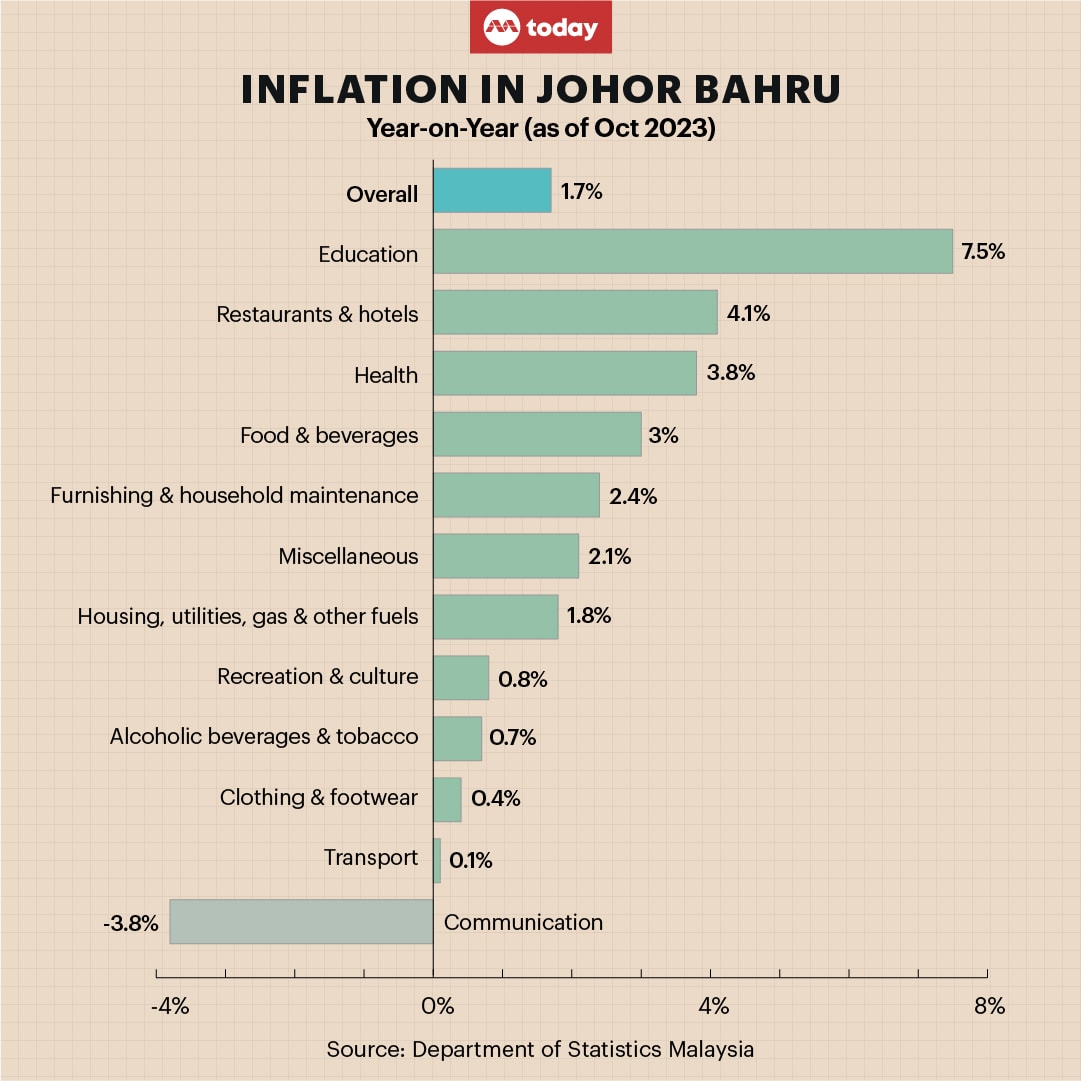



Next
THE BOTTOM LINE
Contrary to common perception, local businesses and economists told TODAY the rising cost of living in Johor Bahru can be attributed to a combination of local and global factors.Some business owners noted that the weakening ringgit has led to a spike in the cost of raw materials, forcing them to have to raise prices to survive or make do with lower profits.
Multi-label fashion store Bev C's owner, Ms Beverly Ang, 40, said while she agreed that Singaporeans have higher spending power, she did not see this as the reason for price hikes in Malaysia, particularly Johor Bahru.
“I think it’s because our political situation is not stable. Our prime minister (Anwar Ibrahim) has only served for a year, so the situation directly impacts our currency exchange rate.”
Sunway University economics professor Yeah Kim Leng said Singaporeans, too, see higher prices of goods and services in their country due to inflation, which has prompted them to travel to Johor Bahru for cheaper goods.
The core inflation of Singapore rose from 3.0 in September to 3.3 per cent in October. The figures stood at 5.5 per cent in January and February, a 14-year high.
Prof Yeah said Johor needs to effectively look into capacity expansion, considering the spike in demand from Singaporeans after Covid-19 restrictions were lifted.
Otherwise, it could lead to “overheating”, whereby an economy is unable to expand to meet the increased demand, resulting in prolonged periods of inflation.
For now, he has yet to see Johor Bahru reach this stage despite the higher price pressures faced due to some slack in the labour and housing markets.
Dr Carmelo Ferlito, chief executive officer of Kuala Lumpur-based think tank Centre for Market Education, said Malaysia is now “paying the consequences” for the policies introduced to alleviate the financial burdens of households during the pandemic.
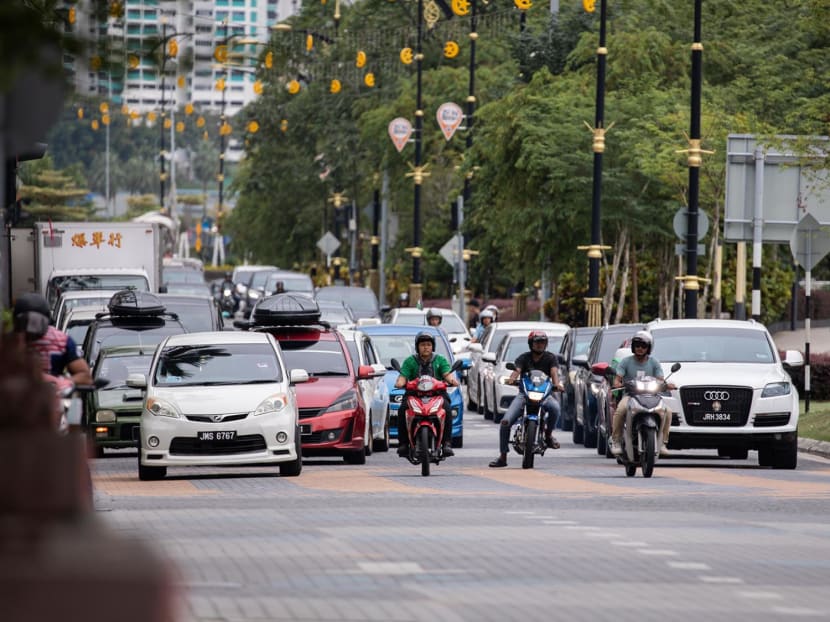
According to Dr Ferlito, an example of one such policy is the launch of economic stimulus packages, such as Prihatin, which was said to be among the largest in the world.
The RM250 billion Prihatin package can be described as the Malaysian equivalent of Singapore’s Unity and Resilience Budgets in 2020.
Asked about the reason for Malaysia’s depreciating ringgit, Dr Ferlito attributed it to two main factors — recent geopolitical tensions, such as the Russia-Ukraine war, and China’s economic slowdown.
On the first point, Dr Ferlito noted that while it may seem as if the ringgit is weakening, it is actually the US dollar strengthening because it is still considered the best reserve of value.
“In moments of uncertainty, the US dollar remains the refuge. The people tend to purchase more safe-haven currencies, so in turn, this has weakened the other currencies, and as a consequence, the ringgit suffers,” he said.
Domestically, Dr Ferlito said China’s economic slowdown has impacted Malaysia. Since Malaysia is an important trade partner of China, he said: “The weakening of China directly affects Malaysia.”
Mr Hazree Mohd Turee, managing director of strategic advisory firm Bower Group Asia Malaysia, explained that Malaysia is a net importer of food as the produce grown locally is not enough to meet domestic demand after catering to exports.
“As a net importer trading in (US dollars), prices will shoot up given our ringgit’s current situation,” he said, adding that it is imperative for Malaysia to tackle food security concerns so that the country can be more self-reliant.



